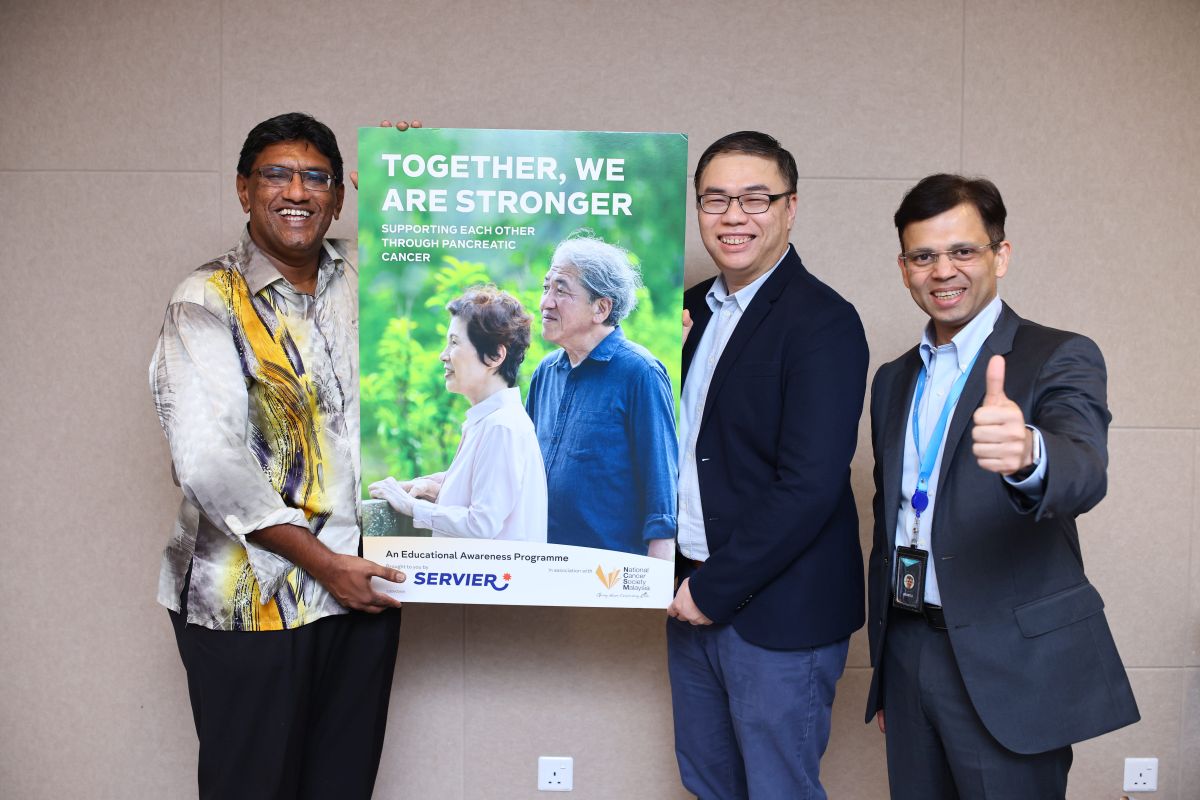KUALA LUMPUR, August 30 – Pancreatic cancer is known as one of the deadliest cancers in the world and was the 12th most common cancer diagnosed worldwide in 2020. It has a poor prognosis with a five-year survival rate of just five to 10 per cent.
The Global Cancer Observatory 2020 (Globocan) report by the World Health Organization (WHO) showed that Malaysia had a total of 1,089 new cases of pancreatic cancer and 1,066 deaths in 2020. The prevalence stood at about two persons in 100,000 persons.
The lower survival rates are mainly due to the fact that detection and diagnosis of pancreatic cancer occur at an advanced stage of the disease when treatment options are limited and surgery is no longer an option.
Despite the grim outlook, there is still a possibility for a cure, if detected and treated early.
As such, preventive and early detection cannot be over emphasised as it is integral to a patient’s journey and health outcomes.
In response to this scenario, pharmaceutical company Servier Malaysia and the National Cancer Society Malaysia (NCSM) have joined hands to escalate awareness on the urgency for a proactive and timely approach to pancreatic cancer management.
Speaking at the launch of the pancreatic cancer educational awareness programme themed ‘Together, We Are Stronger … Supporting Each Other through Pancreatic Cancer’, Dr Kshitij Panse, general manager of Servier Malaysia, said the programme aims to highlight the importance of early detection and intervention, while pointing patients and their families to services and support that can help them embrace the challenges of living with the devastating disease.
“It aligns well with Servier’s focus to always place patients’ voices and needs at the heart of all our activities, from research and development to community programmes.
“Our collaboration with health care professionals to educate and enhance public knowledge about this disease is complemented by NCSM’s psychosocial support services that are available for both patients and their families.”
“Pancreatic cancer is a type of cancer that originates from the pancreas, a vital organ located between the stomach and liver. It occurs when abnormal cells in the pancreas multiply uncontrollably, forming a tumour,” said consultant clinical oncologist Dr Tan Chih Kiang during his presentation at the launch.

According to Dr Tan, pancreatic cancer generally affects more males above the age of 50. Its risk factors include diabetes, smoking, alcohol consumption, obesity, and family history of cancer.
“If someone persistently experiences symptoms such as abdominal or mid-back pain, jaundice, nausea, unintended weight loss, and digestive problems, it is advisable to consult a doctor who may conduct imaging or diagnostic tests to ascertain the cause.”
“As these symptoms are common and vague, a case of pancreatic cancer can often go unnoticed or is mistaken for a less severe condition. This makes early detection challenging, leading to delayed diagnosis, limited treatment options and lower survival rates.”
He said that treatment options for pancreatic cancer depend on the stage of the cancer, and may include surgery, systemic therapy such as chemotherapy and targeted treatment, radiotherapy, as well as palliative and supportive therapy.
“Living with pancreatic cancer can be overwhelming and energy sapping. It can have a devastating impact on the patient, their caregivers and loved ones,” said Dr Murallitharan Munisamy, NCSM managing director.
“This is where NCSM can step up to play an important supportive role. We are here to tell them that they need not walk this journey alone. We are here for them.
Dr Murallitharan said that NCSM’s clinical psychology and multi-disciplinary support services cover the physical, emotional, and mental needs of both patients and their families.
“The services are available from the point of cancer diagnosis up to the survivorship stage.
“It encompasses a wide range of areas, including, emotional support, coping strategies, anxiety and depression management, grief and loss, dietary and nutritional advice as well as guidance to improve their overall quality of life.”
“We invite anyone suffering from pancreatic cancer to reach out to us on our toll-free helpline 1800-88-100. Our overarching aim is to empower patients and their families to stay strong as they support each other and walk the journey together,” he said.
In one unified voice, Dr Kshitij, Dr Tan, and Dr Murallitharan strongly urged the public to be observant of any change in their wellbeing and to always adopt a proactive approach to seek the advice of a doctor and to get treated early.
It is also essential to practise a healthier lifestyle and make necessary lifestyle modifications.












